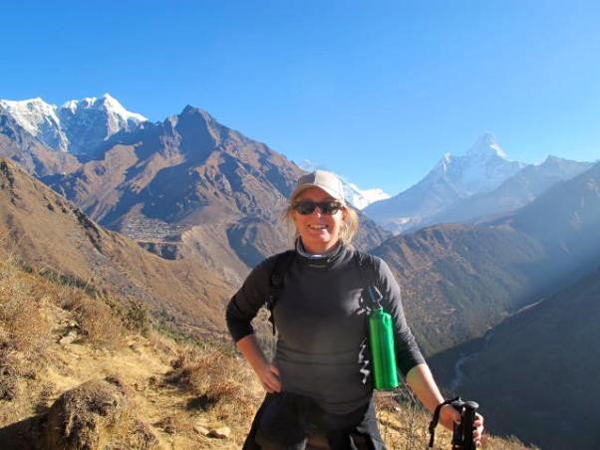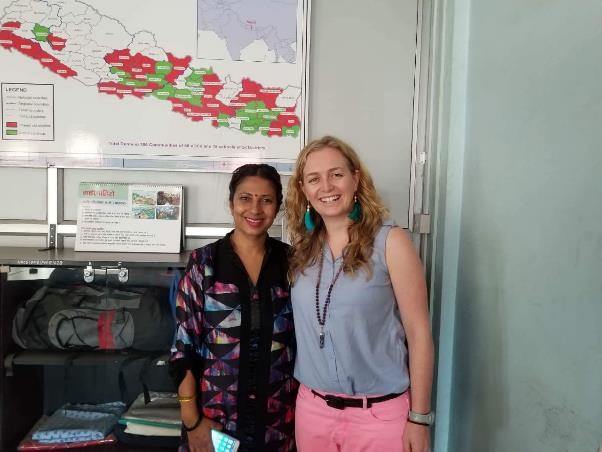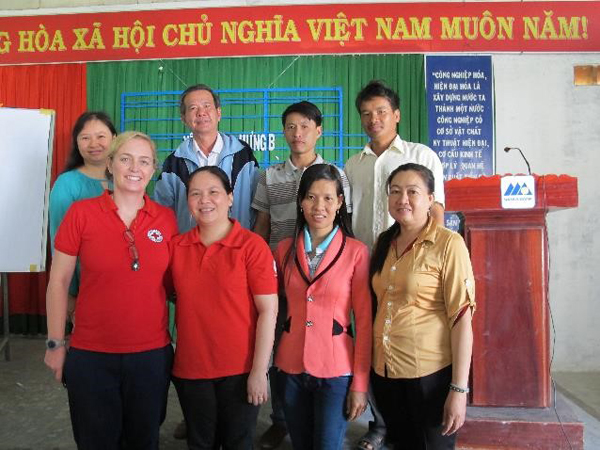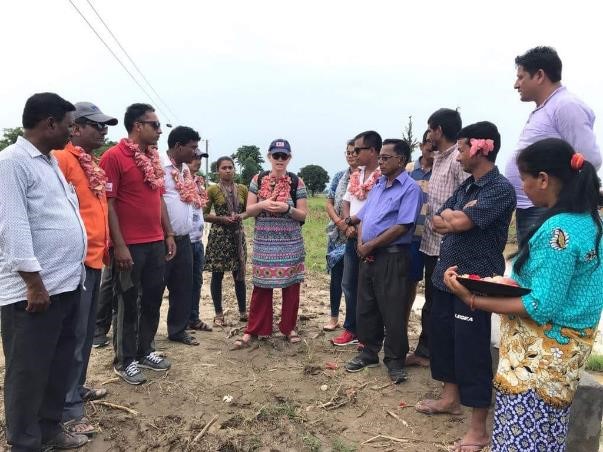31 July 2019

Becky-Jay Harrington
Disaster Management and Urban Resilience Consultant
Bachelor of Business (Management)
Nepal was probably not the most obvious destination when Becky-Jay Harrington graduated from UniSA, but
after six years living and working on the “roof of the world”, the people and place have very much carved her
a second home.
She could never have known it at the time, but it was accepting a position with the NT Treasury Department
following her graduation from UniSA that set Becky-Jay on a path to the Himalayas.
While in Darwin, her interest in humanitarian work was initially piqued when she became involved in projects
that supported Indigenous Australian communities.
“What really struck me was that growing up in Adelaide in the 80s and 90s, I never really had the opportunity
to learn about Indigenous cultures and communities,” says Becky-Jay.
“The United National Human Development Index listed often lists Australia as one of the top three countries
in terms of our quality of life. Aboriginal populations in Australia were ranked around 100th – a stark
difference.
“This experience really showed me that not all things are equal and there is a lot more targeted support
needed to help people reach their potential.”
Shortly after her posting ended in the NT, Becky-Jay moved to Victoria. She was working in the Department
of Human Services’ State Emergency Management Centre after the 2009 Black Saturday bushfires swept
through Victoria, devastating the countryside, destroying over 2000 properties and claiming 173 lives.
“This was really my entry into the disaster and emergency development sector, working on the bushfire
planning and recovery and later working on the Royal Commission’s recommendations,” she says.

Kathmandu.
After two years in the service, and seeking to extend her knowledge of the growing disaster management
sector, she successfully applied for an Australian Government aid volunteer role in Nepal.
“I spent a year supporting the Nepal Ministry of Home Affairs develop their National Emergency Operations
Center,” she says.
“I also found that I had enough time to volunteer with the International Federation of Red Cross and Red
Crescent Societies (IFRC), which led to paid employment with the IFRC for three-and-a-half years working on
community-based disaster risk management programs across Nepal.
“Nepal might be an economically poor country, but it’s a culturally and spiritually rich one – it is such an
interesting place and over the last 10 years I have spent six living here.”
After proving her worth at the IFRC, Becky-Jay was transferred to Hanoi, Vietnam, as the Disaster Risk
Reduction Programme Director for Vietnam for the Australian Red Cross. She was then posted to Fiji where
she managed Recovery Operations for Tuvalu, Papua New Guinea, Kiribati and the Solomon Islands after
Cyclone Pam tore through the region in 2015.
“This work can be extremely challenging, emotionally and physically, and it is important to look after
yourself,” says Becky-Jay.
“You can’t take everything on because it can become overwhelming. If you’re trying to help an individual or a
community and you take their grief and trauma on as your own then it is hard to keep working effectively for
them.”
Studying yoga has given Becky-Jay the balance she says is required to cope with the intense stress and
pressure of disaster and emergency work. When her contract in the Pacific region ended she returned to
Nepal to continue her yoga training.

Shortly after returning, the offer of a two-year contract with the British Red Cross, managing their largest
international project – the Urban Resilience Programme, building disaster management skills with some of
Nepal’s most disadvantaged communities - was too tempting an opportunity to pass up.
Becky-Jay led a team of 100 Red Cross workers and volunteers to deliver the program that is supporting
vulnerable people - including older people, people living with disabilities, people who were homeless, and
single-parent families – to develop resilience to the multiple natural and man-made threats they face.
“These communities tend to suffer more in the wake of a disaster as their needs are often overlooked. For
example, many people who live in improvised dwellings along the riverbanks of Kathmandu are at risk each
year from floods and the government doesn’t allocate resources to protect them or help them rebuild,” says
Becky-Jay.
“As part of this programme we built up these groups by training 840 individual community champions so
they could learn to mobilise their own networks and advocate to the local mayors for funding and resources
for things like clean running water, riverbank reinforcement and support for rebuilding after a disaster.
“We also worked with seven municipality governments on how they can better engage with their
communities and prepare for disasters, as well as training people from the vulnerable groups themselves in
emergency preparedness skills like first-aid.”
When the contract ended Becky-Jay returned to further her yoga training and teaching in Nepal. She is also
currently following her passion for providing a space for individuals of underrepresented genders working in
the humanitarian and international development field to raise their voice with the Stories of Women in Aid
blog that profiles the different experiences of underrepresented workers in the field, particularly cis women,
trans-men and women, non-binary people and others.

to the large 2017 floods in southern Nepal. The Red Cross led the safe evacuation of many
communities from their homes and rebuilt critical infrastructure (such as bridge and latrines)
after the floods subsided.
She also continues to consult for local and international groups working in disaster management, including
the Danish Red Cross.
“My business degree from UniSA has been very beneficial as it gave me the tools I need to manage and
communicate with large and diverse teams, which has really been invaluable and a definite advantage in my
field,” she says.
“A lot of graduates go into this work expecting a paid position immediately as they have a Masters in the
field, and end up disappointed. In order to deepen my knowledge in the field I undertook a Masters in
Community Development (Disaster Management), but I’ve found it is volunteering that has always been the
best first step towards employment in the sector.
“We as humans so often disassociate ourselves from the experiences of others – the ‘it’s not happening
here so it’s not our problem’ argument. Creating more empathy for people that we don’t know and being
open to other people’s stories is really at the heart of humanitarian work – and about making better living
situations for all of us.
“I can’t recommend this work enough. The opportunity to see life from another angle has been an incredible
experience and privilege.”
For more information about the work of the Red Cross in Nepal click here and for more about Becky-Jay and
her endeavours click here.


